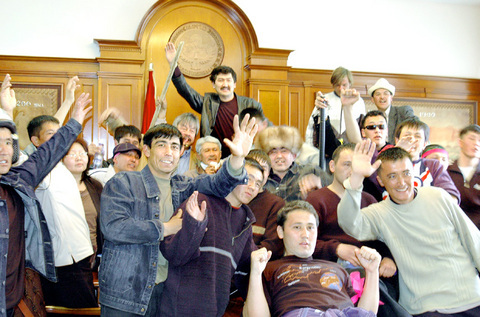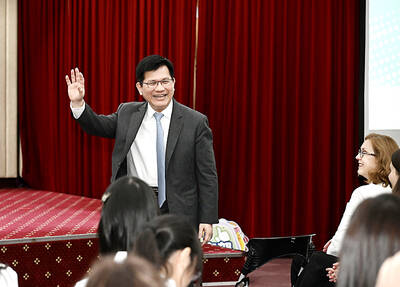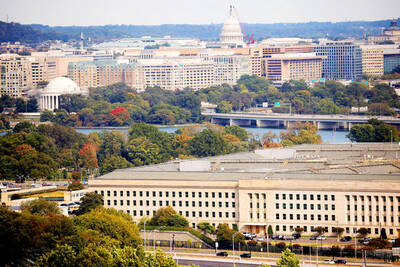Protesters stormed the presidential compound in Kyrgyzstan on Thursday, seizing control of the main symbol of state power after clashing with riot police surrounding it during a large opposition rally.
About 1,000 protesters managed to clear riot police from their positions outside the fence protecting the building, and about half entered through the front. Others smashed windows with stones, while hundreds of police watched from outside the fence, where thousands more protesters remained. Neither side visibly carried any firearms.
The whereabouts of beleaguered President Askar Akayev were not clear, amid reports that he had left the presidential office and arrived at a Russian airbase outside Bishkek. Kurmanbek Bakiyev, one of two main opposition leaders, was with the protesters at the government building.

PHOTO: AFP
Protesters led the defense minister out of the building, holding him by the elbows and trying to protect him, but others threw stones at the military chief and one protester kicked him. Interior Ministry troops led other officials out, and three injured people, bandages covering their wounds, left accompanied by a doctor.
The tumultuous scene was the culmination of the first major rally in the Kyrgyz capital since opposition supporters seized control of key cities and towns in the south this week to press demands that the long-serving Akayev step down amid widespread allegations of fraud in this year's parliamentary vote.
"I am very happy because for 15 years we've been seeing the same ugly face that has been shamelessly smiling at us," said 35-year-old Abdikasim Kamalov, standing outside the building with legs planted apart, holding a red Kyrgyz flag. "We could no longer tolerate this. We want changes."
Kyrgyzstan lacks the rich energy resources or pipeline routes that have made of some of its Central Asian neighbors the focus of struggles by Russia, the US and China for regional influence. But the former Soviet republic's role as a conduit for drugs and a potential hotbed of Islamic extremism, particularly in the impoverished south, makes it volatile.
Both the US and Russia -- which is part of a six-nation military pact with Kyrgyzstan -- maintain military bases near Bishkek, and Moscow said yesterday it had increased security at its facility.
Akayev's whereabouts were not clear. He was to meet later Thursday with an envoy from the Organization for Security and Cooperation in Europe, which had made overtures to help mediate the crisis.
Many of the demonstrators came from a rally on the outskirts of Bishkek, where protesters roared and clapped when an opposition activist asserted Akayev's foes would soon control the entire country.
"The people of Kyrgyzstan will not let anybody torment them," Bakiyev, who heads the People's Movement, told the crowd at the earlier rally. "We must show persistence and strength, and we will win."

FIREPOWER: On top of the torpedoes, the military would procure Kestrel II anti-tank weapons systems to replace aging license-produced M72 LAW launchers Taiwan is to receive US-made Mark 48 torpedoes and training simulators over the next three years, following delays that hampered the navy’s operational readiness, the Ministry of National Defense’s latest budget proposal showed. The navy next year would acquire four training simulator systems for the torpedoes and take receipt of 14 torpedoes in 2027 and 10 torpedoes in 2028, the ministry said in its budget for the next fiscal year. The torpedoes would almost certainly be utilized in the navy’s two upgraded Chien Lung-class submarines and the indigenously developed Hai Kun, should the attack sub successfully reach operational status. US President Donald Trump

Taiwan Semiconductor Manufacturing Co (TSMC, 台積電) is expected to start construction of its 1.4-nanometer chip manufacturing facilities at the Central Taiwan Science Park (CTSP, 中部科學園區) as early as October, the Chinese-language Liberty Times (the Taipei Times’ sister newspaper) reported yesterday, citing the park administration. TSMC acquired land for the second phase of the park’s expansion in Taichung in June. Large cement, construction and facility engineering companies in central Taiwan have reportedly been receiving bids for TSMC-related projects, the report said. Supply-chain firms estimated that the business opportunities for engineering, equipment and materials supply, and back-end packaging and testing could reach as high as

ALL QUIET: The Philippine foreign secretary told senators she would not respond to questions about whether Lin Chia-lung was in the country The Ministry of Foreign Affairs on Wednesday confirmed that a business delegation is visiting the Philippines, but declined to say whether Minister of Foreign Affairs Lin Chia-lung (林佳龍) is part of the group, as Philippine lawmakers raised questions over Lin’s reported visit. The group is being led by Deputy Minister of Agriculture Huang Chao-chin (黃昭欽), Chinese International Economic Cooperation Association (CIECA) chairman Joseph Lyu (呂桔誠) and US-Taiwan Business Council (USTBC) vice president Lotta Danielsson, the ministry said in a statement. However, sources speaking on condition of anonymity said that Lin is leading the delegation of 70 people. Filinvest New Clark City Innovation Park

DEFENSIVE EDGE: The liaison officer would work with Taiwan on drones and military applications for other civilian-developed technologies, a source said A Pentagon unit tasked with facilitating the US military’s adoption of new technology is soon to deploy officials to dozens of friendly nations, including Taiwan, the Financial Times reported yesterday. The US Department of Defense’s Defense Innovation Unit (DIU) is to send a representative to collaborate with Taiwan on drones and military applications from the semiconductor industry by the end of the year, the British daily reported, citing three sources familiar with the matter. “Drones will certainly be a focus, but they will also be looking at connecting to the broader civilian and dual-use ecosystem, including the tech sector,” one source was